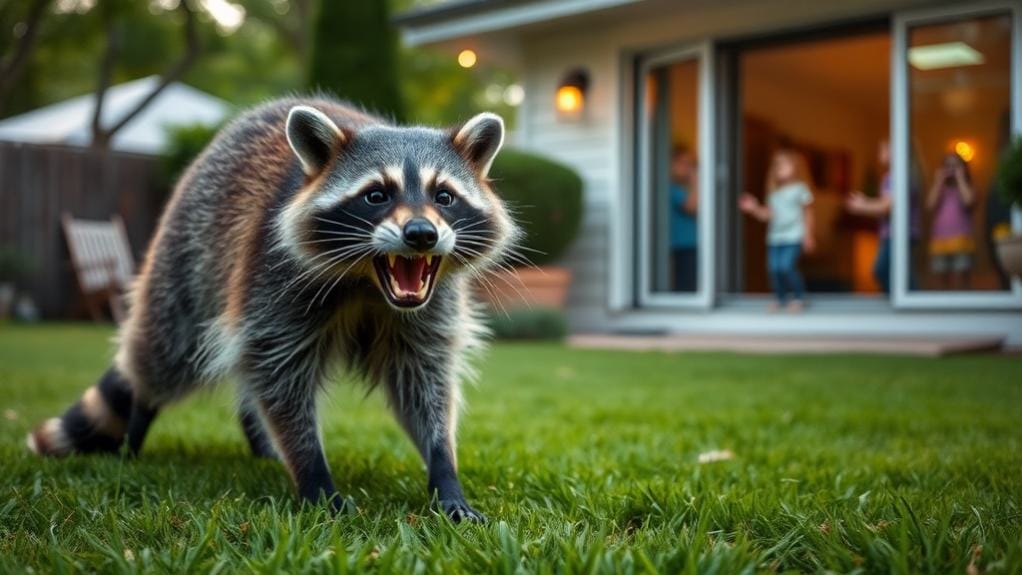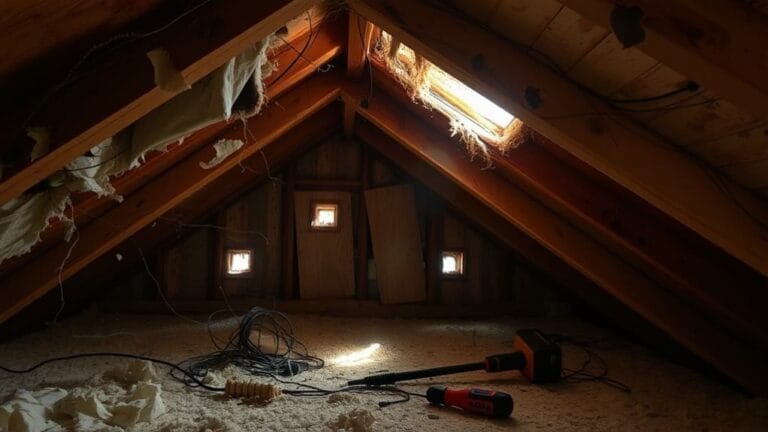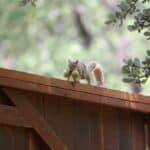If you’ve got an aggressive raccoon in your yard, you need to act fast to protect your kids. Get everyone inside immediately and call animal control – this isn’t a DIY situation. While you wait, secure your property by removing all food sources (yes, even that “hidden” pet food bowl), install motion-activated lights, and guarantee garbage cans have tight-fitting lids. Teach your kids the “no wildlife selfies” rule and show them how to back away slowly if they spot one. Never approach or corner a raccoon showing signs of aggression like drooling or charging. There’s a lot more to keeping your family safe from these masked bandits.
Understanding Raccoon Behavior Patterns
Table of Contents
When it comes to protecting your kids from raccoons, understanding their behavior patterns is your first line of defense.
These masked bandits aren’t just cute wildlife – they’re clever opportunists who’ll raid your yard if given half a chance.
professional removal services may be needed if raccoons become a persistent problem in your area.
Let me break down raccoon behavior basics:
- They’re night owls – seeing one during the day? That’s a red flag for potential health risks.
- Aggressive behavior usually means they’re either protecting babies or sick (neither scenario you want near your kids).
- They’re total food snobs who’ll remember every tasty treat source they find.
Pro tip: If you’ve got raccoons hanging around, they’ve found something worth coming back for – and it’s probably your garbage.
Your best raccoon prevention strategy? Remove what attracts them and they’ll move on.
Trust me, these crafty critters won’t stick around without a reward.
Signs of Aggressive Raccoons

A raccoon’s aggressive behavior sends clear warning signals that you shouldn’t ignore.
When these usually shy creatures start acting bold, you’ve got a raccoon problem brewing. Trust me – if you’re seeing signs of aggression like huffing, grunting, or charging, it’s time to contact a wildlife expert.
Natural deterrents like peppermint oil and cayenne pepper can help keep raccoons away before aggression starts.
Here’s what screams “aggressive raccoon” (and no, they’re not just being friendly):
- Drooling or staggering (Spoiler: This isn’t because they’re tired)
- Getting too close without fear (They’re not trying to be your BFF)
- Making weird noises like huffing or grunting
- Charging at people or pets
*Pro Tip: If a raccoon’s become a common sight in your yard and isn’t running away, don’t wait to guarantee the safety of your kids. When raccoons feel threatened, they won’t politely ask you to leave.*
Creating Safe Outdoor Play Areas

Building a secure outdoor play space requires strategic planning to keep raccoons at bay. I’m going to show you some proactive measures that’ll prevent raccoons from entering your kids’ play area – because let’s face it, no one wants these masked bandits crashing the party.
Using natural deterrent sprays like garlic mixed with chili powder around the perimeter adds an extra layer of protection.
To create a safe play area, you’ll need:
- A six-foot fence buried one foot deep (those little diggers are persistent!)
- Motion-activated lights or sprinklers (surprise sprays work wonders)
- Zero access to food sources
Here’s the deal: You’ve got to be ruthless about securing garbage cans and removing pet food. Those entry points? Seal them up!
Regular inspections are non-negotiable – check for droppings or other signs that these unwanted guests are trying to move in.
*Pro tip: Teaching your kids not to feed wildlife isn’t being mean – it’s being smart.*
Teaching Children Wildlife Safety

Safety measures alone won’t protect kids unless they understand how to act around wildlife.
I’ll show you how to teach your children to stay safe around those masked bandits we call raccoons.
Start by training your kids to spot the signs – overturned garbage cans aren’t exactly subtle hints that wildlife’s nearby.
Consider using natural deterrents like peppermint oil or vinegar around your yard to keep raccoons at bay.
Pro tip: Make it a game to spot raccoon evidence during daylight hours.
Teach these essential rules:
- Never approach or feed raccoons (because who needs an aggressive raccoon BFF?)
- Keep a safe distance – if you can see them, you’re too close
- Alert an adult immediately if they spot one
Role-play different scenarios with your children.
Yes, it might feel silly pretending to be a raccoon, but it’ll help deter dangerous encounters.
Trust me, it’s better than dealing with an actual wildlife confrontation.
Securing Your Property

Making your property raccoon-proof requires strategic thinking and consistent maintenance.
Let me show you how to secure your property and discourage raccoons before they turn your yard into their personal buffet.
Consider installing motion activated lights around your property – they’re incredibly effective at scaring off these nocturnal visitors.
Start with the basics – those trash cans are like an all-you-can-eat diner for raccoons.
Lock them up tight! Install heavy-duty lids and secure them with bungee cords if you have to.
Here’s your raccoon control checklist:
- Build a 6-foot fence that goes at least 1 foot underground to prevent raccoons from digging
- Trim those overhanging tree branches – they’re basically raccoon highways to your roof
- Seal up any gaps in your home’s structure (yes, even that tiny one you’ve been ignoring)
- Remove food sources like pet food and fallen fruit
Pro Tip: *If you’re still having issues after securing everything, don’t play hero – call local animal control.*
Emergency Response Steps

When raccoons become aggressive, you need to act quickly and decisively.
I’ve seen enough panicked reactions to know that staying calm is your best defense – even if that cute trash panda suddenly isn’t so cute anymore.
Their natural climbing abilities and urban adaptability make them particularly challenging to handle when they’re agitated.
Here’s what you’ll do to prevent getting bitten or scratched by an aggressive raccoon:
- Get your children inside. Now. Not in five minutes – right now.
- Back away slowly. No sudden movements or screaming (save the drama for later).
- Keep your eyes on the raccoon but don’t try to be a hero by confronting it.
- Contact animal control or wildlife professionals if the raccoon won’t leave.
Pro Tip: Teach your kids the “no wildlife selfies” rule. Those Instagram likes aren’t worth a trip to the ER.
Remember: A safe distance is your friend.
Let the experts handle this one.
Professional Wildlife Control Options
For persistent raccoon problems, professional wildlife control services offer the most reliable and safest solution.
I’ll tell you why – these experts aren’t just random folks with nets. They’re Certified Wildlife Control Professionals who know exactly how to handle those masked bandits in your yard.
When you hire professionals, here’s what you’ll get:
- Thorough inspections to find every sneaky entry point
- A customized management plan specific to your situation
- Humane raccoon removal that actually works
- Ongoing monitoring to keep those critters away
Pro Tip: Don’t cheap out on this one. Professional wildlife control services guarantee safety for families and pets, plus they’ll prevent those aggressive raccoons from making a comeback.
Trust me – when it comes to protecting your kids, this is one expense that’s worth every penny.
Frequently Asked Questions
Will a Racoon Attack a Child?
I want you to know that raccoons rarely attack children unless they’re threatened or protecting their young. However, I’d advise keeping kids away from raccoons since unprovoked attacks can still happen.
What Do Raccoons Hate the Most?
Like a skunk at a perfume party, I’ve found raccoons absolutely hate strong scents. I’ll tell you they’re most repelled by ammonia, bright lights, loud noises, and spicy scents like hot pepper.
What Does It Mean When a Raccoon Is in Your Yard at Night?
I’ll tell you this: if you’re seeing a raccoon in your yard at night, it’s likely searching for food or shelter. They’re nocturnal creatures, and your yard might offer easy meals from trash or pet food.
How to Deal With an Aggressive Raccoon?
Remain really relaxed when facing an aggressive raccoon. I’d suggest slowly stepping back while making loud noises. Don’t run or approach it. I’ll stay calm and call animal control if it’s acting strangely.
Last Word
Let’s face it – nobody wants their kids tangling with an angry raccoon, right? I’ve shown you the essential steps to protect your family from aggressive wildlife while still enjoying your outdoor space. Remember, it’s all about prevention, awareness, and having a solid plan. Whether you choose to handle the situation yourself or call in the pros, you’re now equipped to keep those masked bandits from turning your yard into their personal playground.








